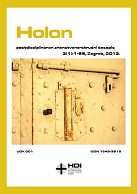Implicitne teorije inteligencije kod djece predškolske dobi
Implicit theories of intelligence in preschool children
Author(s): Ranka Đunđenac, Joško SindikSubject(s): Psychology
Published by: Hrvatsko društvo za integralnost
Keywords: cognitive categories; preschoolers; representation
Summary/Abstract: The aim of this study was to examine the implicit theories of intelligence in preschool children. In addition to the description of implicit theories of intelligence in preschoolers, the aim was to examine differences in the incidence of cognitive and non-cognitive aspects of intelligence in answers given by preschool children. The participants in the study were 93 preschool children who were regular attendees of a kindergarten, in the age range of 4-7 years, of both sexes. The main finding is that the results show expected response of unequally distributed representation of responses in individual cognitive and non-cognitive categories, with a distinct dominance of non-cognitive responses, both in the abstract, and particularly, in the concrete questions posed to children. This is reflected in a higher number of statistically significant differences related to the particular category of S (social skills and personality traits). It is shown that social (but not verbal) skills are significantly prevalent in children's descriptions of intelligence.
Journal: Holon
- Issue Year: III/2013
- Issue No: 1
- Page Range: 6-24
- Page Count: 19
- Language: Croatian

